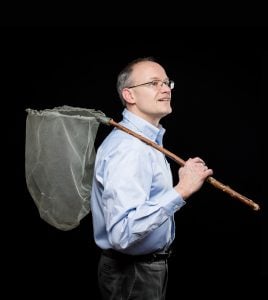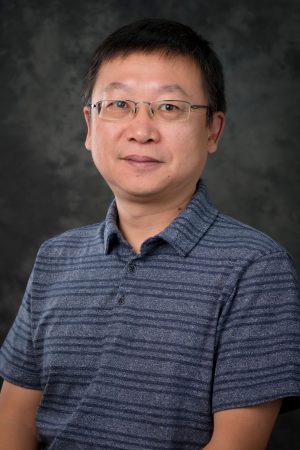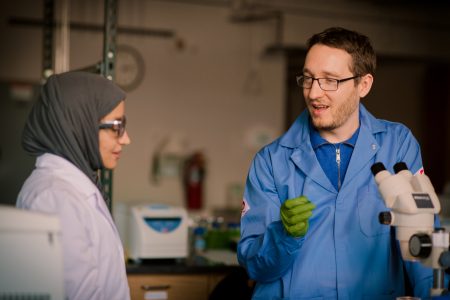Dr. Thomas Werner and a team of researchers recently published a paper in the Journal of Photochemistry and Photobiology B: Biology.
This team is comprised of Ph.D. students Adenike Olowolagba and Dilka Arachchige, Research Scientist Sushil Dwivedi (Chem), undergraduate students Ashlyn Colleen Beatty and Joseph Peters, high school students Crystal Wang and Alicia Guo, Associate Professor Thomas Werner (BioSci), and Associate Professor Rudy Luck and Professor Haiying Liu (both Chem).
The title of the paper is “Dynamic Insights into Mitochondrial Function: Monitoring Viscosity and SO2 Levels in Living Cells.”
This research was funded by the National Institute of General Medical Sciences, National Institutes of Health, through Award Numbers 2R15GM114751 and R15GM114751 (Liu), and R15 GM146206-01 (Liu and Luck). The National Science Foundation also provided support through Award Number 2117318, which made it possible to purchase a new NMR spectrometer for the characterization of the chemical structures of the fluorescent probes, with Liu as a co-PI. High-performance computational calculations for the fluorescent probes were completed using the infrastructure at Michigan Tech.
About Thomas Werner
Very broadly defined, Dr. Thomas Werner is an entomologist who works on different biological questions in drosophilids (“fruit flies”) and lepidopterans (butterflies and moths). One quarter of his research has been published in the journals: Nature, Science, Cell, and PNAS. Werner has received more than $900,000 in total funding, most of which came from the NIH and NSF. He has research-mentored 107 undergraduate students and 7 graduate students. He was bestowed with the state-wide Michigan Distinguished Professor of the Year Award 2021. Dr. Werner has also won Michigan Tech’s Distinguished Teaching Award twice (only three other faculty have won it twice in the history of Michigan Tech) for teaching Immunology, Genetics, Genomics, and Developmental Biology. He also discovered a new species of fruit fly, which he named after his student Tessa Steenwinkel, who won 9 research awards (e.g., the NSF Graduate Research Fellowship and the Barry Goldwater Fellowship) and published 15 articles/books under Thomas’s mentorship. The species is called Amiota tessae. Furthermore, Dr. Werner is the founder of the open-access book series “The Encyclopedia of North American Drosophilids”, which serves the Drosophila research community, students, and teachers with currently three published volumes and nearly 10,000 worldwide downloads. These books transformed two campus libraries (U. of Rochester, NY and Michigan Tech) into open-access book publishers, promoting science and education at no cost.
About the Biological Sciences Department
Biological scientists at Michigan Technological University help students apply academic concepts to real-world issues: improving healthcare, conserving biodiversity, advancing agriculture, and unlocking the secrets of evolution and genetics. The Biological Sciences Department offers seven undergraduate degrees and three graduate degrees. Supercharge your biology skills to meet the demands of a technology-driven society at a flagship public research university powered by science, technology, engineering, and math. Graduate with the theoretical knowledge and practical experience needed to solve real-world problems and succeed in academia, research, and tomorrow’s high-tech business landscape.
Questions? Contact us at biology@mtu.edu. Follow us on Facebook and Instagram for the latest happenings.


